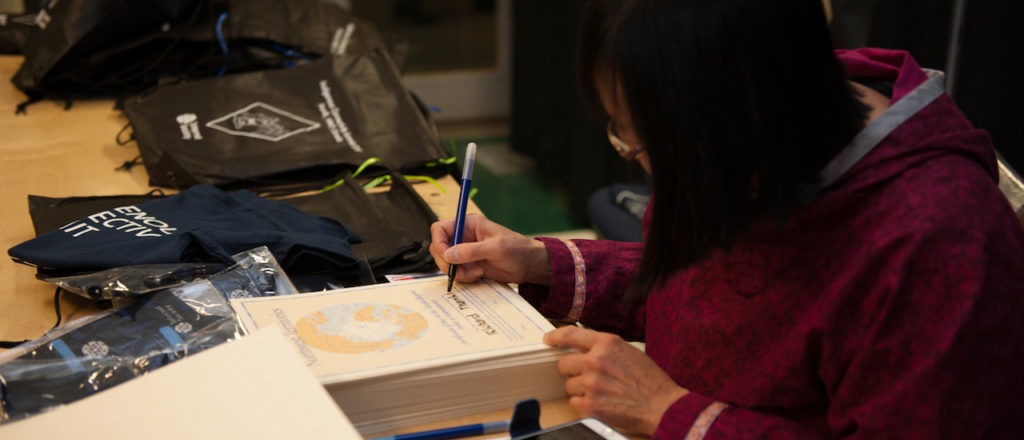Author Archives: Anna Higgins
Author Archives: Anna Higgins

For many of us in quarantine, our only privacy often comes in the form of digital communications. While we’re cooped up in our homes with other people, the online world can be a place to blow off steam, find distractions, and even seek refuge. This is especially true for survivors of domestic violence, sexual violence, stalking, and trafficking, who have historically relied on encrypted communications to find support and an escape.
This year has been particularly hard for survivors. Factor in spiking COVID-19 cases, the long slog of sheltering in place, economic uncertainty, and, in some regions, colder weather and shorter days – plus December and January holidays, which traditionally see an uptick in domestic violence incidents – and you have a perfect storm. Access to private online communication isn’t just a way to find support and escape, but a means of survival.
With the risk of domestic violence higher now, it is even more essential that we protect survivors’ privacy and safety online. In a pandemic, survivors may only be able to rely on digital communications for help, to limit in-person interactions.
This is why we worked with the National Network to End Domestic Violence to put together a Continue reading

COVID-19 has moved many of our lives online, and our conversations around how to further broadband access are no exception. This year, the Indigenous Connectivity Summit is happening virtually for the first time.
After meeting in Santa Fe, Inuvik, and Waimanalo and Hilo, this year we had planned to meet in Winnipeg – the city with the highest Indigenous population in Canada. We will sorely miss seeing our ICS community in person, but we are excited to meet online and demonstrate how important it is for Indigenous communities to connect to the Internet.
An important aspect of the ICS is the space created for community members to engage in conversations sharing similar challenges, connecting with one another, and innovating solutions to the lack of broadband access in their communities. We are excited to continue having these impactful conversations virtually and to recreate a more discussion-based environment than in a typical webinar format. We are also looking forward to having new faces join us this year. Without the barrier of travel, we can now engage with more participants from different communities.
The conversations we hold at the ICS hold significant weight in the policy world. Take our conversations around the Tribal Continue reading

As COVID-19 continues to shine a spotlight on the vital role the Internet plays, a short window of opportunity has opened for the Federal Communications Commission (FCC) to do their part in connecting rural Indigenous communities in the United States.
The Tribal Priority Window is currently open for federally-recognized tribes, Alaska Native Villages, and Hawaiian Homelands to apply for Educational Broadband Service (EBS) spectrum, but it closes on August 3rd. Access to the EBS spectrum would enable Indigenous communities to build their own Internet networks.
The FCC set this deadline before the pandemic, but Tribal governments are now overwhelmed by handling the Coronavirus with limited resources. The FCC must give them more time to apply to the priority window. COVID-19 will not simply disappear from tribal lands in time for tribal governments to pull together applications.
Need proof? One only has to look at the fact that Indigenous communities in the US face the lowest rate of broadband access and the highest per capita rate of COVID-19 infections. The need for access to accurate information and telehealth is at an all-time high. Tribal communities are at serious risk Continue reading

As COVID-19 spreads around the globe, so has misinformation about the virus. Log into any social media account and it’s easy to get confused by friends and family sharing contradictory messages on anything from infection rates, to local preventative measures, and what to do if we feel a dreaded cough coming on.
Truth matters – especially when public health is involved – and we often rely on journalists and news sources around the world to help us separate fact from fiction. And, whether we realize it or not, there’s a digital security tool that is a critical factor in the trust equation: encryption.
In a period that has seen various governments and law enforcement representatives propose laws that would weaken it, the pandemic is an important reminder of the role encryption plays to protect both journalists, their sources, and general news integrity.
End-to-end (E2E) encryption is a tool that keeps digital communications private by scrambling content so that only the sender and receiver have the keys to unscramble and read it.
This is crucial for journalists.
Journalists often rely on secure communication services like E2E messaging apps to connect with sources in a trustworthy way. With COVID-19 spreading, many organizations Continue reading

As we work to foster the multistakeholder model in Internet governance, we must include the voices of youth. They’ve grown up in the age of the Internet, where using connected devices is second nature and we’re beginning to have conversations around issues like encryption and privacy. Young people deserve not just a seat at the table, but to have a say.
Which is why the Internet Society supported the Internet Governance Forum (IGF) USA Youth Day Zero. It’s an event for young people to come together, discuss the Internet policy issues they care most about, and brainstorm potential solutions ahead of the IGF USA. Held at the Center for Democracy & Technology, Day Zero brought together youth from across civil society and academia to ask questions of professionals and talk with one another. It also provided an opportunity for young people to create and foster connections with one another.
The first panel featured professionals who shared how youth could get involved in Internet governance – and the importance of their participation. The panelists were Dustin Phillips (co-chair of the Internet Governance Forum USA and executive director of the Internet Society’s DC chapter), Katie Jordan (Senior Policy Advisor at the Internet Continue reading

What benefits can Internet connectivity bring to Tribal and Indigenous communities – especially when it comes to language and culture preservation? That’s the topic of our panel proposal for South by Southwest (SXSW) 2020: “How Internet Access Can Preserve Native Cultures.”
And we’re excited to announce that you can now vote for it!
SXSW, is an annual conference held in Austin, Texas, USA. The conference’s many events include a music festival, networking opportunities, and panels that focus on technology, governance, film, culture, and music. The panels featured at SXSW live within tracks that range from health and medtech to innovative applications of new technologies. All panels at SXSW are chosen through a public vote so that participants can decide what they want to discuss at the event.
That’s where we need your help!
SXSW is a platform for bringing important policy issues and initiatives to light, which is why we’ve applied. It’s an ideal forum for exposing the impact that technology can have on culture.
If accepted, our panel would discuss specific issues that Tribal and Indigenous areas face when it comes to broadband deployment, the lessons that communities can learn from one another, and how they can Continue reading